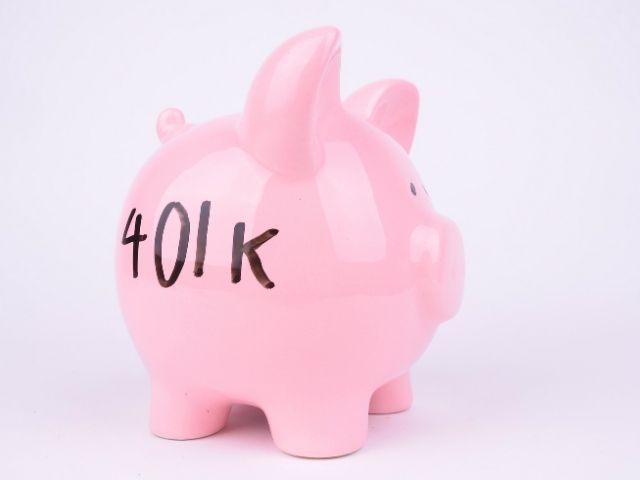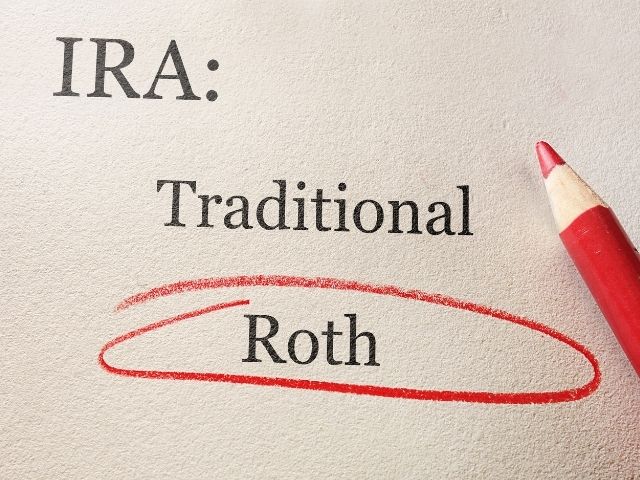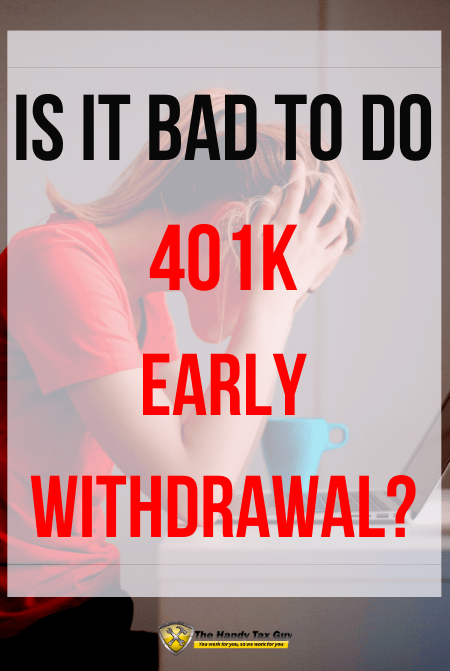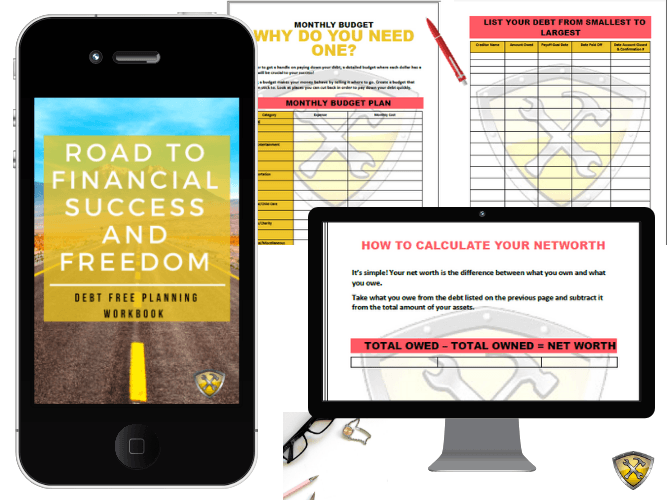Is a 401K early withdrawal a good idea? Is it even an option for you?
We help you understand how it all works in this guide.
Contributing to a 401K means contributing to your future self, and preparing for retirement. Some people, especially during the pandemic, find themselves in need of those funds, though.
THIS POST MAY CONTAIN AFFILIATE LINKS. PLEASE READ MY DISCLOSURE FOR MORE INFO. This means if you click on any of the links, I’ll receive a small commission.

The 401K Explained
A 401K is a retirement plan – a plan that lets you save for the future. You contribute either pre-tax or after-tax funds depending on the type of account you open. Some employers match your contributions up to a limit, for example, 3% of your salary. This is like receiving free money – don’t pass up that opportunity.
A 401K is a qualified retirement plan or a defined-contribution plan. It receives special tax benefits from the IRS. Your balance depends on your contributions and the investments’ performance.
You may only take advantage of the tax benefits if you follow the rules, including avoiding an early 401K withdrawal.
Traditional 401K vs Roth 401K
You may choose a traditional 401K, which you contributed to before taxes and pay taxes upon withdrawal on your contributions and earnings.

There’s also the Roth 401K which you contribute after-tax dollars to but can withdraw your contributions and earnings tax-free.
No matter the type, one factor remains – you must be 59 ½ years old before you withdraw funds or you may face the 401K penalty.
Can you Withdraw Money from your 401K?
A 401K withdrawal is possible, but it may come with a 10 percent penalty, plus a tax liability at your current tax bracket. Ideally, you put the money away for retirement and don’t touch it. The IRS offers tax benefits to those that follow these guidelines.
But life happens, and sometimes you need those funds. First, ask your employer or HR department if early 401K withdrawals are possible – not all employers allow it.
Next, determine if you qualify for a 401K early withdrawal penalty exception.
File with Ease from Home Today!
401K Early Withdrawal Penalty Exceptions
The IRS offers certain 401K penalty exceptions for hardships. Any exception must demonstrate serious and immediate financial need. Any of the following typically qualify:
- Purchase of a primary residence (not an investment property or 2nd home)
- Post-secondary education expenses for yourself, a spouse, or dependent
- To avoid eviction or foreclosure of your primary residence
- Certain expenses incurred to repair the livability of your primary residence
- Birth or adoption of a child
- Paying for funeral expenses
In 2020, there are also the 401K hardship withdrawal exceptions for needs caused by the pandemic. The CARES Act allows hardship withdrawals without penalty if you were impacted by the 2020 pandemic.
The exception allows withdrawals up to $100,000 if one of the following applies if You:
- Were diagnosed/suffered from the 2020 global crisis
- Lost your job, were furloughed, or lost hours due to the pandemic
- Were unable to work due to lack of childcare caused by the pandemic
- Your individually-owned business suffered from the pandemic
- Have unreimbursed medical expenses
You won’t incur the 10 percent penalty and you can spread the tax liability out over three years through 2022. You may also choose to pay the amount back within 3 years and avoid the tax liability.
401K Early Withdrawal Pros & Cons

Pros:
- Access to funds you need and that you contributed
- If you qualify for a hardship or CARES Act exception, you avoid the 10 percent penalty fee
- You don’t have to worry about loan payments which can further your financial struggles
- You may avoid the 10 percent penalty in certain circumstances
Cons:
- You lose the compounded earnings potential
- You’ll owe taxes on the money you withdrew and if not a CARES Act exception, the liability is due in the same year
- You run the risk of the 10 percent penalty if your hardship doesn’t qualify
File with Ease from Home Today!
What to Know About 401K Withdrawal
Now that we have the basics out-of-the-way, let’s go through the most commonly asked questions.

Can you withdraw from 401K without a penalty?
In some cases, you can, but you must qualify for a hardship according to the IRS rules and your employer’s rules. Not all employers offer hardship withdrawal options.
If you don’t qualify, you’ll pay your ordinary income taxes plus a 10 percent penalty. For every $10,000 you withdraw, that’s $1,000 deducted off the top, plus regular taxes.
What qualifies for a hardship withdrawal from 401K?
Financial issues that affect your life or wellbeing may qualify as a hardship. Any expenses incurred with your primary residence, whether buying or repairing one, covering tuition and room/board costs for post-secondary school, unreimbursed medical expenses, and the birth/adoption of a child may qualify.
Should I cash out my 401K to pay off debt?
Paying off debt is not a hardship and would incur the 10 percent penalty plus ordinary taxes if you withdrew from your 401K. Find alternatives to help pay off your debt such as debt consolidation loans or credit counseling.
What happens if you leave your job before age 59 ½?
Leaving your job (voluntarily or not) is a distributable event. It’s not an excuse to cash in your 401K, though. You must either leave it, roll it over into another qualified retirement account, or withdraw it.
If you withdraw the funds, this isn’t a qualified exception. You’ll pay the 10 percent penalty plus your standard tax liability.
4 Easy Tips to Remember
- Only make a 401K withdrawal early if it’s absolutely necessary
- See if a 401K loan would be a better/less expensive option
- Know your plan’s rules as not all plans allow early withdrawals for all IRS-approved scenarios
- You may only withdraw the amount of your contributions – not the earnings
Final Thoughts
Before you make a 401K early withdrawal, exhaust all other options, and talk to your employer. They ultimately have the final say in your decision. If your employer allows early withdrawals, make sure you qualify for an exception or budget in the 10 percent penalty plus the taxes.

If you qualify for an exception under the CARES Act, you have more time to make good on your debt or even to repay the money you withdraw, removing all tax liabilities for the time being.
Take care until the next money adventure!
Handy

Disclaimer Statement: All data and information provided on this site is for informational purposes only. The Handy Tax Guy makes no absolute representation of the correctness, mistakes, omissions, delays, appropriateness, or legitimacy of any information on this site. **Note: Each client circumstance will vary on a case-by-case basis**


